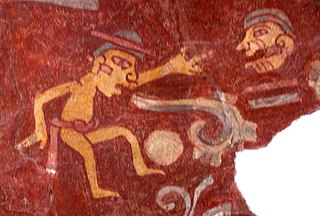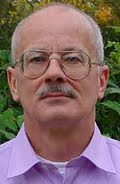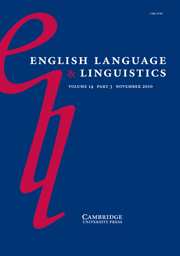Computational linguistics is an interdisciplinary field concerned with the computational modelling of natural language, as well as the study of appropriate computational approaches to linguistic questions. In general, computational linguistics draws upon linguistics, computer science, artificial intelligence, mathematics, logic, philosophy, cognitive science, cognitive psychology, psycholinguistics, anthropology and neuroscience, among others.

In linguistics, the comparative method is a technique for studying the development of languages by performing a feature-by-feature comparison of two or more languages with common descent from a shared ancestor and then extrapolating backwards to infer the properties of that ancestor. The comparative method may be contrasted with the method of internal reconstruction in which the internal development of a single language is inferred by the analysis of features within that language. Ordinarily, both methods are used together to reconstruct prehistoric phases of languages; to fill in gaps in the historical record of a language; to discover the development of phonological, morphological and other linguistic systems and to confirm or to refute hypothesised relationships between languages.

Language is a structured system of communication that consists of grammar and vocabulary. It is the primary means by which humans convey meaning, both in spoken and written forms, and may also be conveyed through sign languages. The vast majority of human languages have developed writing systems that allow for the recording and preservation of the sounds or signs of language. Human language is characterized by its cultural and historical diversity, with significant variations observed between cultures and across time. Human languages possess the properties of productivity and displacement, which enable the creation of an infinite number of sentences, and the ability to refer to objects, events, and ideas that are not immediately present in the discourse. The use of human language relies on social convention and is acquired through learning.
A lexeme is a unit of lexical meaning that underlies a set of words that are related through inflection. It is a basic abstract unit of meaning, a unit of morphological analysis in linguistics that roughly corresponds to a set of forms taken by a single root word. For example, in English, run, runs, ran and running are forms of the same lexeme, which can be represented as RUN.
In phonology and linguistics, a phoneme is a set of phones that can distinguish one word from another in a particular language.

Phonology is the branch of linguistics that studies how languages systematically organize their phones or, for sign languages, their constituent parts of signs. The term can also refer specifically to the sound or sign system of a particular language variety. At one time, the study of phonology related only to the study of the systems of phonemes in spoken languages, but may now relate to any linguistic analysis either:
Corpus linguistics is the study of a language as that language is expressed in its text corpus, its body of "real world" text. Corpus linguistics proposes that a reliable analysis of a language is more feasible with corpora collected in the field—the natural context ("realia") of that language—with minimal experimental interference. The large collections of text allow linguistics to run quantitative analyses on linguistic concepts, otherwise harder to quantify.
An idiom is a phrase or expression that usually presents a figurative, non-literal meaning attached to the phrase. Some phrases which become figurative idioms, however, do retain the phrase's literal meaning. Categorized as formulaic language, an idiom's figurative meaning is different from the literal meaning. Idioms occur frequently in all languages; in English alone there are an estimated twenty-five million idiomatic expressions.

A creole language, or simply creole, is a stable natural language that develops from the process of different languages simplifying and mixing into a new form, and then that form expanding and elaborating into a full-fledged language with native speakers, all within a fairly brief period of time. While the concept is similar to that of a mixed or hybrid language, creoles are often characterized by a tendency to systematize their inherited grammar. Like any language, creoles are characterized by a consistent system of grammar, possess large stable vocabularies, and are acquired by children as their native language. These three features distinguish a creole language from a pidgin. Creolistics, or creology, is the study of creole languages and, as such, is a subfield of linguistics. Someone who engages in this study is called a creolist.
In linguistics, an object is any of several types of arguments. In subject-prominent, nominative-accusative languages such as English, a transitive verb typically distinguishes between its subject and any of its objects, which can include but are not limited to direct objects, indirect objects, and arguments of adpositions ; the latter are more accurately termed oblique arguments, thus including other arguments not covered by core grammatical roles, such as those governed by case morphology or relational nouns . In ergative-absolutive languages, for example most Australian Aboriginal languages, the term "subject" is ambiguous, and thus the term "agent" is often used instead to contrast with "object", such that basic word order is often spoken of in terms such as Agent-Object-Verb (AOV) instead of Subject-Object-Verb (SOV). Topic-prominent languages, such as Mandarin, focus their grammars less on the subject-object or agent-object dichotomies but rather on the pragmatic dichotomy of topic and comment.
Applied linguistics is an interdisciplinary field which identifies, investigates, and offers solutions to language-related real-life problems. Some of the academic fields related to applied linguistics are education, psychology, communication research, information science, natural language processing, anthropology, and sociology. Applied linguistics is a practical use of language.

Robert Lawrence Trask was an American-British professor of linguistics at the University of Sussex, and an authority on the Basque language and the field of historical linguistics.
Etymology is the scientific study of the origin and evolution of a word's semantic meaning across time, including its constituent morphemes and phonemes. It is a subfield of historical linguistics, philology, and semiotics, and draws upon comparative semantics, morphology, pragmatics, and phonetics in order to construct a comprehensive and chronological catalogue of all meanings that a morpheme, phoneme, word, or sign has carried across time.

David Crystal, is a British linguist who works on the linguistics of English language.
Linguistics is the scientific study of language. Linguistics is based on a theoretical as well as a descriptive study of language and is also interlinked with the applied fields of language studies and language learning, which entails the study of specific languages. Before the 20th century, linguistics evolved in conjunction with literary study and did not exclusively employ scientific methods.
The Tutong language, also known as Basa Tutong, is a language spoken by approximately 17,000 people in Brunei. It is the main language of the Tutong people, the majority ethnic group in the Tutong District of Brunei.
Wakasihu, or Larike-Wakasihu after the two still-vigorous dialects, is an Austronesian language of Ambon Island in the Maluku Islands.

Professor Anvita Abbi is an Indian linguist and scholar of minority languages, known for her studies on tribal languages and other minority languages of South Asia. In 2013, she was honoured with the Padma Shri, the fourth highest civilian award by the Government of India for her contributions to the field of linguistics.
Martin Bygate is a British linguist. He is currently an honorary professor at the Department of Linguistics and English Language of Lancaster University, United Kingdom. His research focuses on applied linguistics with a special focus on tandem language learning, pedagogical grammar and task-based language learning.







